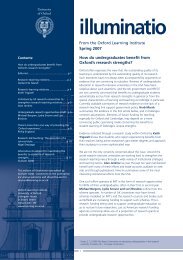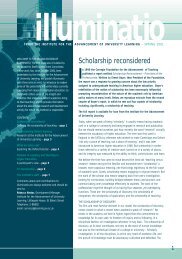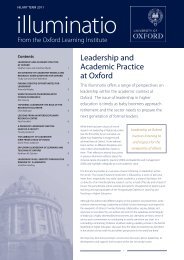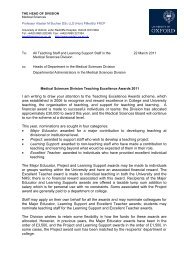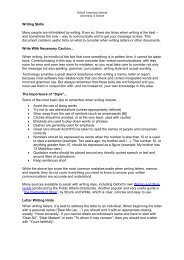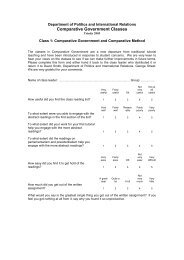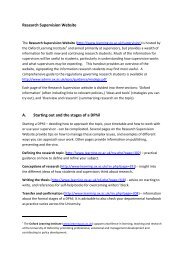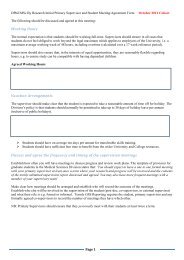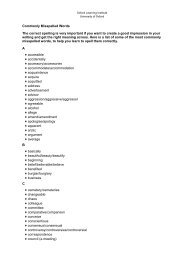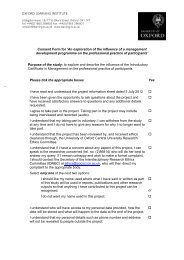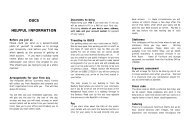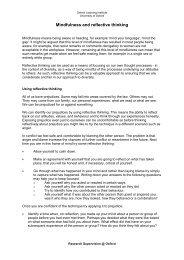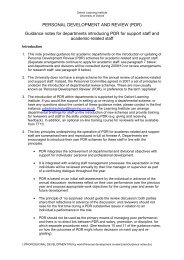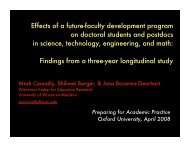Developing the whole student - Oxford Learning Institute - University ...
Developing the whole student - Oxford Learning Institute - University ...
Developing the whole student - Oxford Learning Institute - University ...
Create successful ePaper yourself
Turn your PDF publications into a flip-book with our unique Google optimized e-Paper software.
Stimulus paper by Kathleen M. Quinlan 12<br />
Study abroad<br />
Study abroad experiences seem to promote intercultural and international awareness,<br />
knowledge and understanding and a greater growth in principled reasoning 73 . In <strong>the</strong> UK<br />
<strong>student</strong>s often take a gap year before entering university. Well-structured gap years that<br />
involve substantial periods of immersion in volunteer service in developing countries can<br />
also prompt significant personal growth 74 .<br />
An underlying pedagogical <strong>the</strong>ory<br />
Holistic <strong>student</strong> development assumes <strong>the</strong>re will be some personal growth or change.<br />
Thus a model of learning that focuses on personal transformation is particularly helpful.<br />
In addition to <strong>the</strong> principles of learning cited in <strong>the</strong> previous paragraph, transformative<br />
learning <strong>the</strong>ory 75 offers a specific <strong>the</strong>oretical lens for explaining <strong>the</strong> educational conditions<br />
that foster <strong>student</strong> development. The model from <strong>the</strong>se authors consists of three<br />
main ingredients:<br />
I Transformative learning starts with an experience (eg a project in <strong>the</strong> community;<br />
a conversation with someone from a different background in a hall of residence an<br />
encounter with a patient or a <strong>student</strong> or a client);<br />
I Students critically reflect on that experience;<br />
I Students engage in dialogue with o<strong>the</strong>rs about it.<br />
Their model of learning is holistic in that it explicitly acknowledges <strong>the</strong> role of emotion<br />
in <strong>the</strong> experience and reflection on it. They characterise learning as a process of ‘seefeel-consider-change’<br />
ra<strong>the</strong>r than ‘analyse-think-change’. Au<strong>the</strong>nticity to self and in<br />
relationships is important in <strong>the</strong> reflection and dialogue steps and diverse peer interactions<br />
are most effective in <strong>the</strong> dialogue process. Transformative learning requires a supportive<br />
environment or context for <strong>student</strong> learning; time pressures or assessment pressures can<br />
militate against it. This model helps thread toge<strong>the</strong>r <strong>the</strong> empirical findings described above<br />
and can be used to design o<strong>the</strong>r <strong>student</strong> learning experiences that are likely to lead to<br />
holistic <strong>student</strong> development.<br />
73<br />
Pascarella and Terenzini (2005),<br />
Arthur, Wilson et al (2009)<br />
74<br />
O’Shea (in press)<br />
75<br />
Mezirow (2000), Mezirow and<br />
Taylor (2009)<br />
76<br />
This model was inspired by<br />
and adapted from Personal<br />
Investment Theory, <strong>the</strong><br />
conceptual framework used in<br />
Braskamp et al (2006). Braskamp<br />
uses <strong>the</strong> <strong>the</strong>ory at <strong>the</strong> level<br />
of <strong>the</strong> <strong>student</strong>, arguing that<br />
holistic <strong>student</strong> development<br />
depends upon <strong>student</strong>s having<br />
a supportive socio-cultural<br />
environment, <strong>student</strong>s’ sense<br />
of self and <strong>the</strong>ir patterns of<br />
behaviour. These components<br />
interact to support <strong>the</strong> process<br />
of <strong>student</strong> development and<br />
I have extended this idea to<br />
leadership.<br />
What leadership is required for such<br />
initiatives?<br />
The preceding sections have focused on understanding holistic <strong>student</strong> development<br />
and identifying specific curricular and teaching strategies aligned with that goal, which<br />
university leaders might choose to promote. In this section I propose that <strong>the</strong>re are three<br />
main aspects of leadership that are needed to promote holistic <strong>student</strong> development,<br />
as illustrated in Figure 1 below 76 . First, leaders are in a position to create supportive<br />
environments for <strong>student</strong> development by helping to foster organisational conditions in<br />
which <strong>student</strong>s can grow holistically. Second, leaders need to focus on <strong>the</strong>ir own inner<br />
lives – <strong>the</strong>ir sense of self – so that <strong>the</strong>y are modelling lives of purpose, meaning and<br />
integrity. Finally, returning to <strong>the</strong> <strong>the</strong>sis put forward in <strong>the</strong> introduction and underpinning<br />
this paper, knowledge of and involvement in <strong>the</strong> specific curricular and teaching strategies<br />
that can promote holistic <strong>student</strong> development (as discussed in <strong>the</strong> previous section) is<br />
an essential, although under-discussed, aspect of leadership in higher education. Taken<br />
toge<strong>the</strong>r, <strong>the</strong>se three components address both <strong>the</strong> inner and outer lives of leaders and<br />
show how <strong>the</strong>se aspects of leadership work interact and mutually reinforce each o<strong>the</strong>r.



